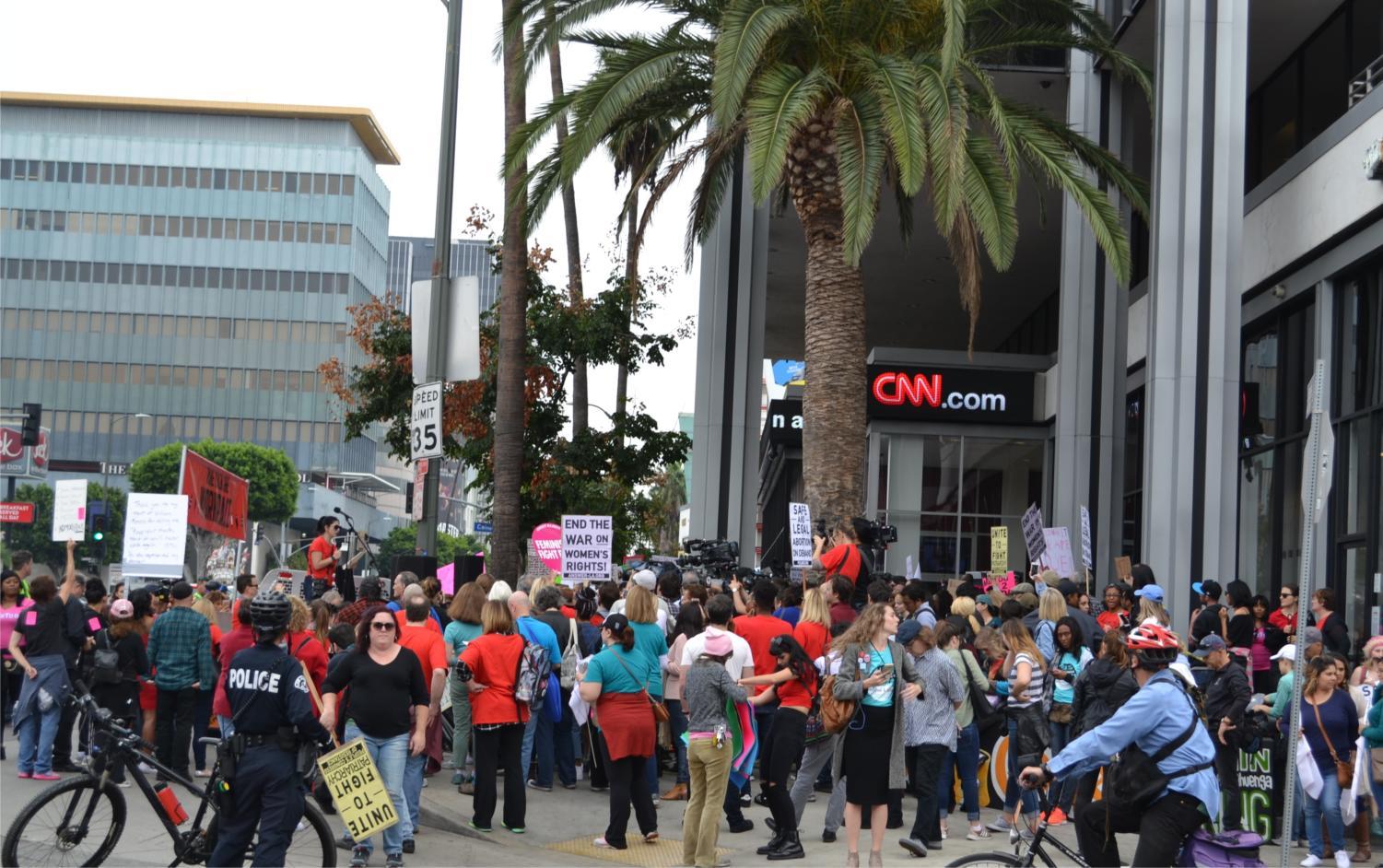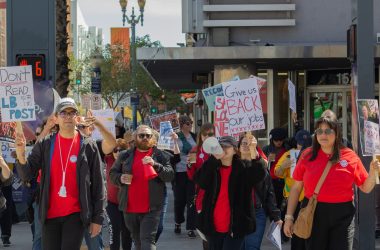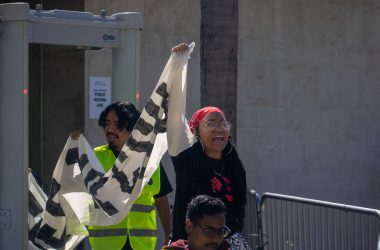Crowds of hundreds gathered within the bustling streets of Hollywood Sunday to march in protest against sexual harassment and assault.
College students, celebrities, men and women of different ages and backgrounds came together to raise awareness about the growing issue of sexual misconduct. The streets became a sea of red t-shirts, displaying “take back the workplace,” with silhouettes of female firefighters, doctors and police officers.

Event organizers chant through loud speakers to rally the crowds 11/12.
Accusations against Hollywood movie producer Harvey Weinstein sparked the #MeToo movement, a social media campaign aimed to bring attention to the normalization of sexual assault and rape. The movement dominated social media platforms three weeks ago and gained national attention, but hasn’t let up.
Recently, six women accused filmmaker Brett Ratner of sexual misconduct. Actress Olivia Munn said in an interview to the Los Angeles Times that she has “made specific, conscientious choices not to work with Brett Ratner.”
Sexual harassment and assault survivors shouted “stop the violence, stop the rape” at the march.
“I think a lot of women live in daily fear because toxic masculinity is ingrained deeply in our culture,” said Ashley Woods, a 25-year-old Los Angeles actress. She held a sign above her head with both hands that read “actors against rape culture” in bold, capital letters as she chanted along with the growing crowd huddled in front of the CNN building on Sunset Boulevard.
Woods shared that she hasn’t been a victim of sexual assault herself, but feels great compassion for those who have experienced it.
Cal State Long Beach junior psychology major Hailey Skaife was also among the ever-growing crowd. When asked what drew her to this event, she replied frankly.
“I was raped back in May,” she said.
Skaife said she faced skepticism surrounding the circumstances of her assault and how it contributed to her desire to speak out and share her story.
“Especially at my age, people are so quick to say, ‘did you cause your rape or something?’” Skaife said. “No, I didn’t say anything, I didn’t do anything to make someone rape me.”
Her mother stood beside her, clutching the leash of their family Labrador. Skaife went on to share how she’s found comfort and resources through the university’s sexual assault program.
“They offer so much, like yoga for healing and free therapy, outreach programs,” she explained. “It’s really awesome.”

Hailey Skaife, 20, pictured with mother, Rebecca and their silver Labrador 11/12.
Skaife and her mother were just one example of the many mother/daughter couples peppering the crowd. Early education about sexual assault was a common theme discussed by both event speakers and inner circles throughout the march and rally.
Katherine Fugate, a screenwriter who helped create the movie “Valentine’s Day” and the television series “Army Wives,” was one of the mothers who came with their children to the march. Her daughter Madeline, 10, explained that she wishes no one had to protest, but believes it’s necessary to help end sexual violence. Her jean jacket was adorned with a slough of pins and buttons of both serious and playful nature. One read “The Future is Female” another had a white snow monkey.
“People have to stop this so that we can have a peaceful world,” she said with a serious face.
Fugate is the leader of an action group called First They Came. She brings Madeline to every meeting and believes that education about sexual autonomy is important to raising a more informed generation.
“I explain to her that this is her body,” she said while gesturing to the young girl. “It’s not anyone’s to touch. She doesn’t have to use her body to get any advancement.”

Katherine Fugate with daughter Madeline, 10, protest together 11/12.
Because of her work in the film industry, Fugate has seen firsthand what triggered the #MeToo movement. She believes it hasn’t been made clear in society that everybody is valuable and that’s something she and her action group hope to change.
“We are not at fair and equal yet; for people of color, for women, for gay people, for people who don’t pray the way we think they should,” Fugate said. “We’re not at fair and equal yet, and until we get there, we’ll be protesting.”




